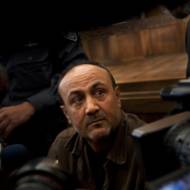Your cart is currently empty!

Leader of Palestinian Hunger Strike Caught Eating

Barghouti, who inspired some 1000 Palestinian prisoners to undergo a hunger strike, was caught on camera eating in his cell.
Palestinian arch-terrorist Marwan Barghouti, revered as a hero by the Palestinian people, launched a hunger strike of some 1000 Palestinian prisoners, but was caught on camera last week eating.
Barghouti, in solitary confinement after publishing an op-ed in the New York Times against the Israeli “occupation,” is seen in video footage released by the Israel Prison Service (IPS) hiding in the bathroom, where he ate a candy bar on May 5 and cookies on April 27. He then tries to flush the rapper down the toilet several times and washes his mouth and face in an attempt to conceal any traces of food.
“As I said from the very beginning, this hunger strike was never about the conditions of the convicted terrorists, which meet international standards. It is about advancing Marwan Barghouti’s political ambitions to replace Abu Mazen [Palestinian Authority head Mahmoud Abbas],” stated Minister of Public Security Gilad Erdan.
Barghouti is said to have launched the strike in an attempt to gain political clout. He was elected last December to first spot in Fatah, the PA’s ruling party, and remains the most popular among all nationalist and Islamist Palestinian leaders.
Erdan accused Barghouti of being a “murderer and hypocrite who urged his fellow prisoners to strike and suffer while he ate behind their back. Just like he lied to the world when he wrote in The New York Times that he decided to strike in order to protest ill-treatment, he lied to the Palestinian public when he claimed to be striking. Israel will not give in to extortion and pressure from terrorists.”
Barghouti gained prominence during the second Palestinian intifada as leader of Tanzim, the armed wing of Fatah, which carried out multiple terrorist attacks against Israeli civilians, including children. He was arrested by Israel in April 2002 and charged in relation to suicide bombings and shooting attacks that claimed the lives of hundreds of Israeli civilians and soldiers and wounded hundreds more. He was convicted in May 2004 for his involvement in three terrorist attacks in Israel that killed five people: Greek Orthodox monk Tsibouktsakis Germanus; police officer Sgt.-Maj. Salim Barakat, 33; Yoela Hen, 45; Eli Dahan, 53; and Yosef Habi, 52.
Israeli Ambassador to the United Nations Danny Danon, in his address to the Jerusalem Post Conference in New York on Sunday, reacted to the footage of Barghouti.
“The man who led terror attacks against women and children is now hiding in his cell and breaking the fake strike he claims to lead,” Danon stated. “This is yet another example of how this prisoners strike is just a media stunt which seeks to glorify terrorists with blood on their hands.”
An Israeli Fabrication?
The Palestinians dismissed the incriminating footage as an Israeli fabrication.
The National Committee for the Freedom and Dignity Strike, a joint committee formed by the Palestinian Prisoner’s Society (PPS) and Palestinian Committee for Prisoners’ Affairs supporting the Palestinian prisoner hunger strike, denounced the video as part of an Israeli “war of lies” to discredit the strike. They claimed the footage dated back to at least 2004.
The committee said IPS’ decision to share the footage and present it as recent was evidence that Israel was “waging a serious war of lies and misleading information to create a state of confusion in the Palestinian public and among hunger striking prisoners.”
Fadwa Barghouti, the arch-terrorist’s wife, said during a news conference on Sunday that the “Israel government’s fabrications” showed “the extent of the (Israeli) occupation’s decline,” adding that it would not affect the resolve of the prisoners participating in the strike.
Several hundred Palestinian prisoners have already dropped the strike.
By: Max Gelber, United with Israel

Subscribe to Our FREE Newsletter for More Great Stories Like This One
United with Israel publishes stories like this every day. We believe that our work allows a more balanced view of Israel to emerge. With so much anti-Israel media bias out there from outlets like CNN and the BBC, helping the Holy Land means getting our message out to as many people as possible.
You can help.
Subscribe to our free newsletter to ensure that you get the latest and best stories from United with Israel. Together we can make a difference, and it starts with communication.
Source: United with Israel
